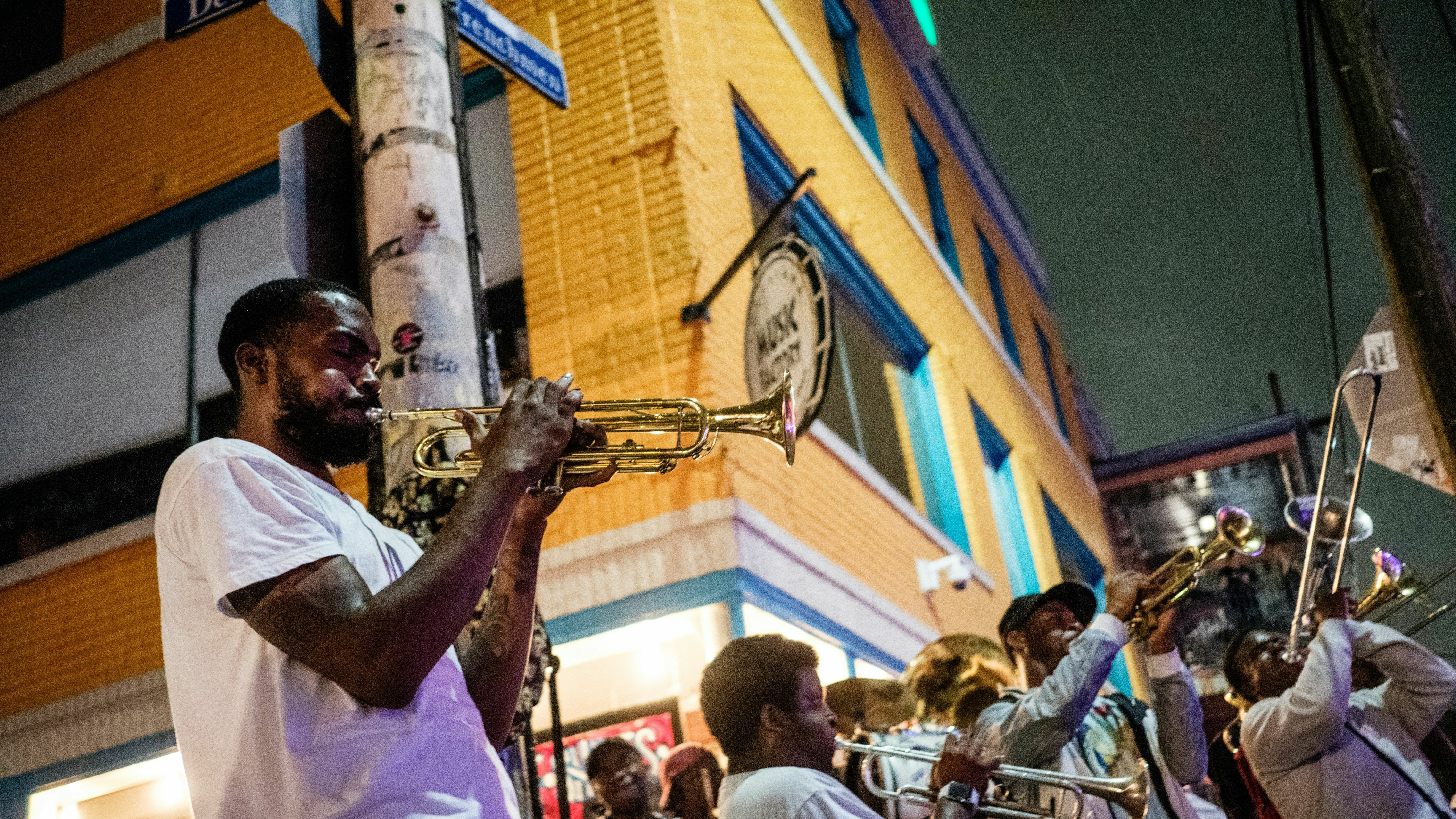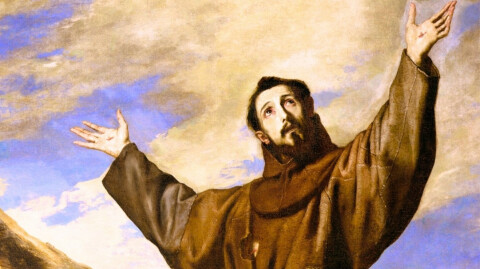TLDR: In this blog I remember a conversation I once had at a Goodwill store about the work of the Holy Spirit in our lives. I hope you enjoy it.
There is an old joke I really like. The Holy Trinity was planning a vacation and the Son wanted to go to New York City. The Father said, “New York City, with all that noise and traffic? I don’t think so!” He then offered a suggestion, “How about we go to Jerusalem?” The Son exclaimed, “After what happened to me there last time? No way, I am not going.” Thinking about it for a second the Father offered another possibility, “We could go to New Orleans, Louisiana.” The Holy Spirit jumped in enthusiastically. “New Orleans? That is a wonderful idea, I’ve never been there before!” Rather than a put down, the locals in NOLA take this as a compliment. NOLA is a place to let go and let loose. A place to enjoy life to the fullest and let the good times roll. But there is also a bit of a reputational misrepresentation. There is a lot of Spirit in NOLA. Great food, excellent museums, the best jazz music in the world, great shopping, etc. So, don’t judge the book by its cover, and if you do, make sure you are holding a hurricane in your hand, while gorging on raw oysters at some dive bar on Bourbon Street.
I have a personal story about assumptions. Several years ago, I was shopping at a Goodwill Store, dressed in clericals from head to toe: Black slacks, black clergy shirt, Roman collar, and a black jacket. I looked more Catholic than the Pope. At some point, an older lady, between 75 and 80, approached me and asked me, “Excuse me?” I turned to her eager to help, as she looked like someone who needed help. She asked, “Have you accepted Jesus as your Lord and Savior?” At first, I wanted to say, “No, Ma’am, I live in New Orleans” but I am glad I didn’t say this. I felt a little hurt. Certainly, she must have realized that I was a clergy person. Rather than getting frustrated, I chose to ask her what she meant by this. After listening to her for a few minutes, I realized she was talking about was Baptism in the Holy Spirit, and more particularly, “being slain by the Spirit.” Ironically enough, I have never been “caught or slain by the spirit.” In other words, I had never collapsed while someone was praying over me.
There is a difference in how Catholic and Anglo-Catholic traditions, on the one hand, and Evangelicals (Pentecostals, for example), on the other, see the working of the Holy Spirit. For this lady, Baptism in the Holy Spirit happens at some point in your adult life, usually accompanied by a rather dramatic collapse or slaying. She explained that the pastor issues an altar call, leads you into the sinner’s prayer, lays his hands on your forehead, and prays for the Holy Spirit to come upon you. Suddenly, you are “slain by the Spirit.” As she explained it, you can go to church every week for years and not be saved, unless you have been baptized by the Holy Spirit. She explained that sometimes you can be watching a revival on TV and, upon the preacher’s instructions, place your hand on the screen and, suddenly, you are overcome by the Spirit. I thought this was very cool because the only feeling I get when watching some televangelists is an overwhelming desire to buy a Mercedes Benz.
For the Catholic Traditions, the workings of the Holy Spirit are less an explosion that happens all at once, but rather a slow process of intervention in the life of the believer that starts at infant Baptism and continues over time. The Holy Spirit works in the first way, as we saw in the readings for Pentecost back in June. The disciples saw tongues of fire aligning on their heads, were moved to the Core, and started preaching the Gospel boldly and courageously. Prior to this event, the frightened disciples were hiding in locked places for fear of the authorities. After this event, they were “on- fire”. They began to boldly preach the Gospel with such enthusiasm and conviction that people thought they were “drunk with new wine”. After this event, a purely local and somewhat exclusive enterprise became a universal Church, as thousands of people from many different countries were able to understand the Gospel of Jesus Christ in their own language, and took that message with them when they went back home. The Holy Spirit burst into the earthly stage and a young church became the vehicle through which God shared with the world the Good News of his Son, Jesus Christ, the only Savior of the human race.
The Holy Spirit also works in the second way as well. Jesus promised that after he ascended to the Father, he would send the “Paraclete” to his disciples. The literal translation of “Paraclete” is “one who comes alongside”. Some have used it in a legal sense as someone who speaks for someone else, from which we get the word “Counselor”. But we should not understand the Holy Spirit as a “Counselor” in the sense of one who gives us advise or in the sense of a defense attorney. I personally like the expression, “One who comes alongside,” and one who accompanies us in our journey. The Holy Spirit works like the slow burn of Gasoline, a steady source of power who is “with us forever” (John 14:16); who “teaches and reminds us of Jesus' words” (John 14:26); who “testifies and witnesses on Jesus' behalf” (John 15:26); and who “proves the world wrong about sin, righteousness, and judgment” (John 16:7-11). The Holy Spirt comes alongside the believers and gives them the courage to endure as they are hated by the same world that hated Jesus (John 15:18); a world to which they do not belong (John 15:19); and which will persecute them as they persecuted Jesus (15:20).
“One role of the Paraclete is to be the presence of God/Jesus with the community. That presence is needed because the community is being hated and persecuted by the world” (Stoffregen, “Exegetical Notes”, www.crossmarks.com). The Holy Spirit is the great explosion that has the power to ignite a life- saving belief in Christ (which is what I believe happens at Baptism), and the Holy Spirit is also the slow burn that allows us to initiate our journey of faith, protects us from the “Evil One,” and feeds us spiritually along the way. It is important we understand the role of the Holy Spirit in our lives. The Holy Spirit does not place himself at the center of the stage, does not testify about himself, and does not witness to his own power. Rather, the Holy Spirit is like the stage lights that remain hidden during the production, but which illuminate and point to the main character in the story, which is Christ. The Theologian J.I. Packer states, “The Spirit's message to us is never, “look at me; listen to me; come to me; get to know me”, but always, “Look at him, and see his glory; listen to him and hear his word; go to him and have life; get to know him and taste his gift of joy and peace. The Spirit, we might say, is the matchmaker, the celestial marriage broker, whose role it is to bring us and Christ together and ensure that we stay together” (James Packer, “Your Father Loves You”, Harold Shaw Publishers, 1986.)
I pray that we may let the Holy Spirit come alongside us to guide our lives and to point them in Christ’s direction. May the Spirit’s amazing power make us contagious, courageous, and transforming Christians.
Blessings to all, Fr. Roman+





